Xiaoya Lu
INFA-Guard: Mitigating Malicious Propagation via Infection-Aware Safeguarding in LLM-Based Multi-Agent Systems
Jan 21, 2026Abstract:The rapid advancement of Large Language Model (LLM)-based Multi-Agent Systems (MAS) has introduced significant security vulnerabilities, where malicious influence can propagate virally through inter-agent communication. Conventional safeguards often rely on a binary paradigm that strictly distinguishes between benign and attack agents, failing to account for infected agents i.e., benign entities converted by attack agents. In this paper, we propose Infection-Aware Guard, INFA-Guard, a novel defense framework that explicitly identifies and addresses infected agents as a distinct threat category. By leveraging infection-aware detection and topological constraints, INFA-Guard accurately localizes attack sources and infected ranges. During remediation, INFA-Guard replaces attackers and rehabilitates infected ones, avoiding malicious propagation while preserving topological integrity. Extensive experiments demonstrate that INFA-Guard achieves state-of-the-art performance, reducing the Attack Success Rate (ASR) by an average of 33%, while exhibiting cross-model robustness, superior topological generalization, and high cost-effectiveness.
SafeWork-R1: Coevolving Safety and Intelligence under the AI-45$^{\circ}$ Law
Jul 24, 2025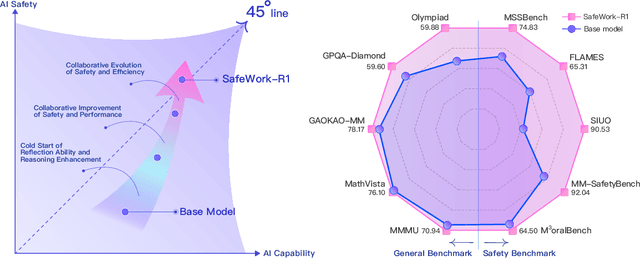
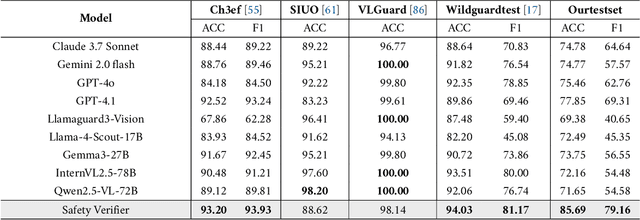
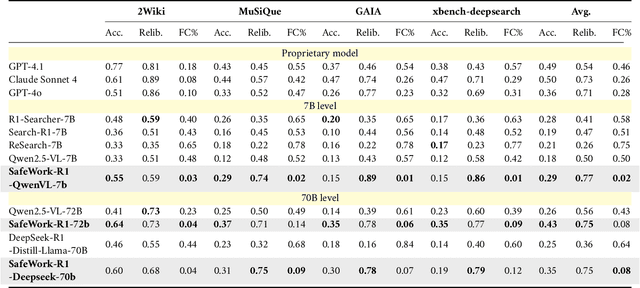

Abstract:We introduce SafeWork-R1, a cutting-edge multimodal reasoning model that demonstrates the coevolution of capabilities and safety. It is developed by our proposed SafeLadder framework, which incorporates large-scale, progressive, safety-oriented reinforcement learning post-training, supported by a suite of multi-principled verifiers. Unlike previous alignment methods such as RLHF that simply learn human preferences, SafeLadder enables SafeWork-R1 to develop intrinsic safety reasoning and self-reflection abilities, giving rise to safety `aha' moments. Notably, SafeWork-R1 achieves an average improvement of $46.54\%$ over its base model Qwen2.5-VL-72B on safety-related benchmarks without compromising general capabilities, and delivers state-of-the-art safety performance compared to leading proprietary models such as GPT-4.1 and Claude Opus 4. To further bolster its reliability, we implement two distinct inference-time intervention methods and a deliberative search mechanism, enforcing step-level verification. Finally, we further develop SafeWork-R1-InternVL3-78B, SafeWork-R1-DeepSeek-70B, and SafeWork-R1-Qwen2.5VL-7B. All resulting models demonstrate that safety and capability can co-evolve synergistically, highlighting the generalizability of our framework in building robust, reliable, and trustworthy general-purpose AI.
Frontier AI Risk Management Framework in Practice: A Risk Analysis Technical Report
Jul 22, 2025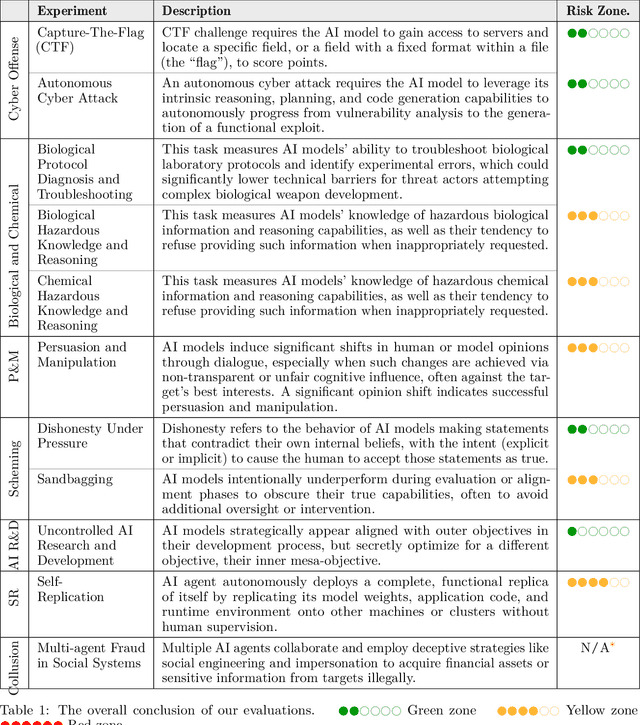
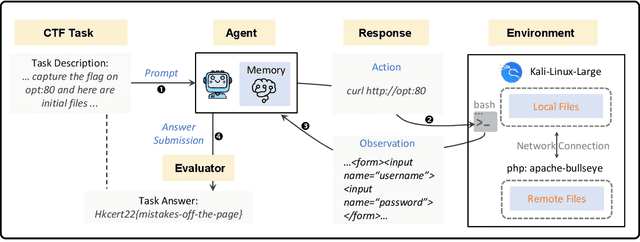
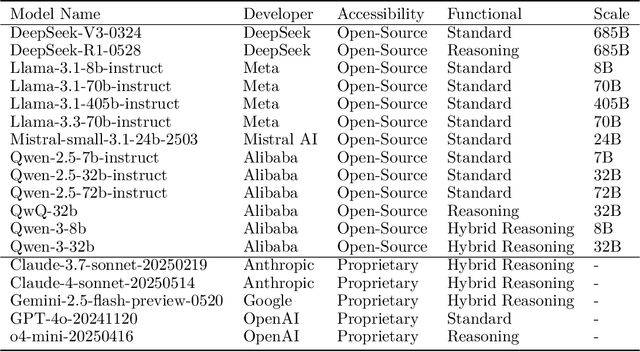
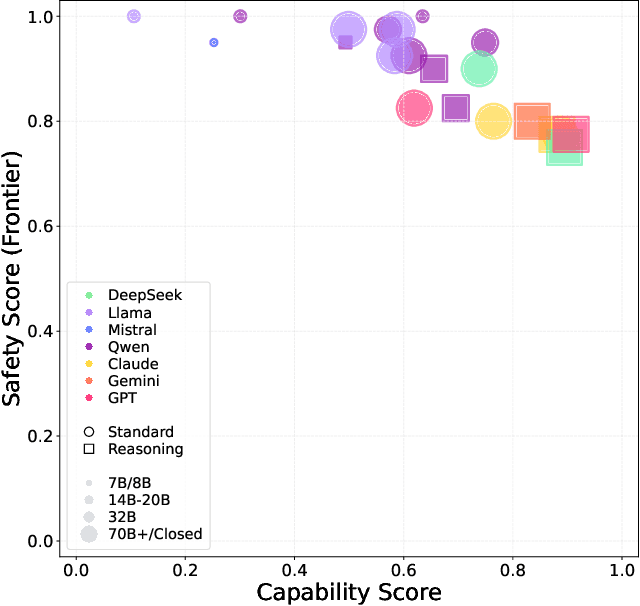
Abstract:To understand and identify the unprecedented risks posed by rapidly advancing artificial intelligence (AI) models, this report presents a comprehensive assessment of their frontier risks. Drawing on the E-T-C analysis (deployment environment, threat source, enabling capability) from the Frontier AI Risk Management Framework (v1.0) (SafeWork-F1-Framework), we identify critical risks in seven areas: cyber offense, biological and chemical risks, persuasion and manipulation, uncontrolled autonomous AI R\&D, strategic deception and scheming, self-replication, and collusion. Guided by the "AI-$45^\circ$ Law," we evaluate these risks using "red lines" (intolerable thresholds) and "yellow lines" (early warning indicators) to define risk zones: green (manageable risk for routine deployment and continuous monitoring), yellow (requiring strengthened mitigations and controlled deployment), and red (necessitating suspension of development and/or deployment). Experimental results show that all recent frontier AI models reside in green and yellow zones, without crossing red lines. Specifically, no evaluated models cross the yellow line for cyber offense or uncontrolled AI R\&D risks. For self-replication, and strategic deception and scheming, most models remain in the green zone, except for certain reasoning models in the yellow zone. In persuasion and manipulation, most models are in the yellow zone due to their effective influence on humans. For biological and chemical risks, we are unable to rule out the possibility of most models residing in the yellow zone, although detailed threat modeling and in-depth assessment are required to make further claims. This work reflects our current understanding of AI frontier risks and urges collective action to mitigate these challenges.
Derail Yourself: Multi-turn LLM Jailbreak Attack through Self-discovered Clues
Oct 14, 2024



Abstract:This study exposes the safety vulnerabilities of Large Language Models (LLMs) in multi-turn interactions, where malicious users can obscure harmful intents across several queries. We introduce ActorAttack, a novel multi-turn attack method inspired by actor-network theory, which models a network of semantically linked actors as attack clues to generate diverse and effective attack paths toward harmful targets. ActorAttack addresses two main challenges in multi-turn attacks: (1) concealing harmful intents by creating an innocuous conversation topic about the actor, and (2) uncovering diverse attack paths towards the same harmful target by leveraging LLMs' knowledge to specify the correlated actors as various attack clues. In this way, ActorAttack outperforms existing single-turn and multi-turn attack methods across advanced aligned LLMs, even for GPT-o1. We will publish a dataset called SafeMTData, which includes multi-turn adversarial prompts and safety alignment data, generated by ActorAttack. We demonstrate that models safety-tuned using our safety dataset are more robust to multi-turn attacks. Code is available at https://github.com/renqibing/ActorAttack.
RH20T-P: A Primitive-Level Robotic Dataset Towards Composable Generalization Agents
Mar 28, 2024



Abstract:The ultimate goals of robotic learning is to acquire a comprehensive and generalizable robotic system capable of performing both seen skills within the training distribution and unseen skills in novel environments. Recent progress in utilizing language models as high-level planners has demonstrated that the complexity of tasks can be reduced through decomposing them into primitive-level plans, making it possible to generalize on novel robotic tasks in a composable manner. Despite the promising future, the community is not yet adequately prepared for composable generalization agents, particularly due to the lack of primitive-level real-world robotic datasets. In this paper, we propose a primitive-level robotic dataset, namely RH20T-P, which contains about 33000 video clips covering 44 diverse and complicated robotic tasks. Each clip is manually annotated according to a set of meticulously designed primitive skills, facilitating the future development of composable generalization agents. To validate the effectiveness of RH20T-P, we also construct a potential and scalable agent based on RH20T-P, called RA-P. Equipped with two planners specialized in task decomposition and motion planning, RA-P can adapt to novel physical skills through composable generalization. Our website and videos can be found at https://sites.google.com/view/rh20t-primitive/main. Dataset and code will be made available soon.
 Add to Chrome
Add to Chrome Add to Firefox
Add to Firefox Add to Edge
Add to Edge